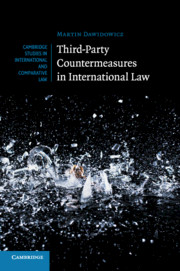Book contents
- Frontmatter
- Contents
- Foreword
- Preface
- Table of Cases
- List of Abbreviations
- 1 Introduction
- 2 Third-Party Countermeasures and the ICJ
- 3 Third-Party Countermeasures in the ILC
- 4 Third-Party Countermeasures in State Practice
- 5 Permissibility of Third-Party Countermeasures: Evaluation
- 6 Third-Party Countermeasures and Safeguards against Abuse
- Conclusion
- Bibliography
- Index
- Miscellaneous Endmatter
5 - Permissibility of Third-Party Countermeasures: Evaluation
Published online by Cambridge University Press: 01 June 2017
- Frontmatter
- Contents
- Foreword
- Preface
- Table of Cases
- List of Abbreviations
- 1 Introduction
- 2 Third-Party Countermeasures and the ICJ
- 3 Third-Party Countermeasures in the ILC
- 4 Third-Party Countermeasures in State Practice
- 5 Permissibility of Third-Party Countermeasures: Evaluation
- 6 Third-Party Countermeasures and Safeguards against Abuse
- Conclusion
- Bibliography
- Index
- Miscellaneous Endmatter
Summary
It is now convenient to assess whether the substantial body of practice examined in previous chapters is indicative of an emerging rule of customary international law entitling States to resort to third-party countermeasures in defence of communitarian norms. Although Judge Read in the Fisheries case appeared to suggest otherwise, the actual conduct of States clearly does not amount to the ‘only convincing evidence’ of State practice. Account must be taken of all available State practice. The body of actual practice – i.e. ‘the conduct of States “on the ground”’ examined in Chapter 4 – should, as appropriate, be assessed alongside the statements made by States in the UN General Assembly's Sixth Committee during the ILC's work on State responsibility examined in Chapter 3. Contradictory practice in this respect must also be given appropriate weight.
As Judge Tanaka observed in the North Sea Continental Shelf cases, it is sometimes a ‘delicate and difficult matter’ to determine with confidence whether an alleged rule of customary international law has come into existence. The answer may, in the final analysis, boil down to a matter of appreciation or judgment to be exercised by an informed observer based on flexible legal criteria. In short, as Judge Tanaka reminds us, the various elements of a rule of custom ‘cannot be mathematically and uniformly decided’. These points seem especially apt for practice concerning third-party countermeasures. The added layers of complexity involved in the assessment of this practice (especially its somewhat obscure and overlapping nature) have already been noted in Chapters 1 and 4.
Beyond the pragmatic reasons against third-party countermeasures examined in Chapter 3, it appears that the ILC – motivated by the thrust of opinion in the Sixth Committee – was reluctant to recognize the concept precisely because of some of these complexities. The ILC essentially advanced three legal arguments in support of its conclusion. The present chapter will assess these arguments and consider whether the ILC's position is actually borne out by State practice (5.1). This will be followed by an assessment of a number of other salient considerations emerging from practice (5.2) before some concluding observations are made (5.3).
- Type
- Chapter
- Information
- Third-Party Countermeasures in International Law , pp. 239 - 284Publisher: Cambridge University PressPrint publication year: 2017



